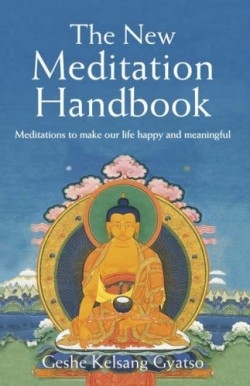
The New Meditation Handbook
Meditations to Make Our Life Happy and Meaningful
Americans grow up believing in life, liberty, and the pursuit of happiness. While Westerners have found relative consensus on life and liberty, an agreed-upon definition of happiness is elusive. Today, according to some, the pursuit of happiness leads to rampant consumption as a means of feeding the voracious appetites for material comfort stimulated by mass media. Despite all that most Americans have, true happiness still eludes.
The author’s traditional Tibetan Buddhist perspective on life, death, desire, and suffering in this book provides the non-Buddhist lay reader an intriguing anodyne to modern anxiety and search for meaning. “The real method to make ourself happy,” Gyatso writes, “is to control our own mind. By controlling our mind-in particular, our anger, our attachment, and especially our self grasping-all our problems will disappear.”
Gyatso, born in Tibet and a respected teacher who has established 150 Buddhist Centers in thirty-four countries around the world, directs his book to the “specific needs and inclinations of Westerners.” While The New Meditation Handbook is not light reading as it outlines the basic doctrines of Mayahana Buddhism, it provides a direct and provocative entry into the theology and philosophy of Tibetan Buddhism for the interested lay reader.
In addition to providing a theoretical background for meditation, the author presents twenty-one meditations with accompanying explanations that address “our fluctuation of mood [that] arise because we are too closely involved in the external situation. We are like a child making a sandcastle who is excited when it is first made, but who becomes upset when it is destroyed by the incoming tide.”
While much of this volume may be perplexingly unfamiliar to the Western reader-“The principal obstacle that prevents us from attaining liberation and enlightenment is self grasping, a deeply ingrained misconception of the way things exist”-the book explicates the principles of one of the world’s oldest religions in such a way that the reader is given much to ponder and consider.
During this time of international tension and terrorism, when governments and groups justify violence as a legitimate means of achieving peaceful ends, Gyatso’s Buddhist perspective is particularly refreshing: “If we think carefully, we shall realize that all our present and future happiness depends upon our cherishing others-upon our wanting others to be happy.” While many readers, steeped in Western ironic cynicism, may dismiss this perspective as naïve and unreal in this world, Geshe Kelsang Gyatso’s words provide a stimulatingly peaceful perspective.
Reviewed by
Duncan Sprattmoran
Disclosure: This article is not an endorsement, but a review. The publisher of this book provided free copies of the book to have their book reviewed by a professional reviewer. No fee was paid by the publisher for this review. Foreword Reviews only recommends books that we love. Foreword Magazine, Inc. is disclosing this in accordance with the Federal Trade Commission’s 16 CFR, Part 255.
